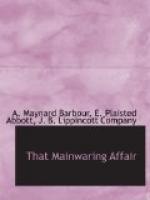“He was alone at that time?”
“Yes, sir.”
“How did he appear?” inquired Mr. Thornton.
“The same as usual, except that he seemed very weary.”
“Was he in this room?” asked Mr. Mainwaring.
“No, sir; he was seated in the library.”
The sound of voices in the corridor attracted Mr. Mainwaring’s attention, and he turned quickly to his son, —
“Hugh, I hear your mother’s voice; go and meet her. The ladies must not be allowed to come in here.”
Mr. Thornton turned to accompany young Mainwaring. Near the door he met his daughter and Miss Carleton, while a little farther down the corridor were Isabel Mainwaring and her mother. With terror-stricken faces they gathered about him, unable to believe the terrible report which they had learned from the servants. As best he could, he answered their numerous inquiries, and, having escorted them to another part of the house, left them in charge of young Mainwaring, while he returned to the library.
Meanwhile, the news of the murder had spread with lightning-like rapidity, and already crowds of people, drawn by that strange fascination which always exists for a certain class in scenes of this kind, were gathering on the grounds outside the house, forming in little groups, conversing with the servants, or gazing upward with awe-stricken glances at the closely-drawn shutters of the room in the tower. The invisible barriers which so long had excluded the public from Fair Oaks had been swept away by the hand of death, and rich and poor, capitalist and laborer, alike wandered unrestrained up and down the oak-lined avenue.
At the door of the library, Mr. Thornton found Ralph Mainwaring and the attorney conversing together in low tones.
“Yes,” Mr. Mainwaring was saying, “as you say, it is undoubtedly murder; but I confess I am at a loss to understand the motive for such a deed, unless it were robbery; and you do not seem to give that idea much credence?”
Mr. Whitney shook his head decidedly. “Unless we find very strong evidence in that direction, I cannot believe that this is any case of common robbery.”
“But to what other motive would you attribute it?” inquired Mr. Mainwaring.
“Until further facts have been developed which may throw light upon the subject, I do not feel prepared to say what the motive might have been.”
“You evidently have your suspicions,” remarked Mr. Mainwaring, while Mr. Thornton inquired,-
“Had our cousin any enemies that you know of?”
Mr. Whitney turned a keen, penetrating glance upon Mr. Thornton for an instant, and the latter continued,-
“I thought it possible that in his business relations he might have incurred the enmity of some one of whom you knew.”
“No,” the attorney answered, quickly, “I am not aware of anything of that nature. Mr. Mainwaring made few intimate friends, but he was universally respected by all who knew him. If he had any enemies,” he added, very slowly, “they were within his own household.”




